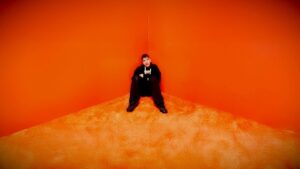Boston-based fashion entrepreneur behind Heart Art, Paris, sat down with Kickin’ It With Kerms, for a candid and style-driven conversation about the evolution of his creative journey, from streetwear beginnings to building a legacy brand rooted in authenticity.
The episode offers an in-depth look at Paris’s fashion ethos, business roots, and the philosophies shaping his reputation as one of Boston’s style figures.
Paris’s journey in fashion began in 2009 with a brand called Hello New World, which was born during a major turning point in his life. He redirected his energy into building a clothing line that he described as being “for the people.” That early venture leaned into bold statements and outward expression.
Over time, that vision sharpened into something more intimate and personal. His latest project, Heart Art, reflects an evolved philosophy and fashion that comes from within, driven by passion rather than trend cycles. With the tagline follow your heart, the brand now centers on what inspires Paris directly, without the pressure of chasing external validation.
Throughout the episode, Paris makes it clear that exclusivity, individuality, and high-end craftsmanship are key to his personal style. He avoids mainstream or easily accessible pieces and instead leans into runway-only items and limited-edition designer fashion. His current wardrobe includes pieces from Chrome Hearts, Balenciaga, and Louis Vuitton, particularly those not available in traditional retail outlets.
He also reflects on why he rarely shares his sources or style methods. He sees fashion as something deeply personal, almost sacred. That approach, he suggests, sets him apart in a world flooded with imitation and fast trends.
The drive to build something of his own is rooted in family. Paris was raised in a household of entrepreneurs, with a father who ran a construction company, a mother who owned salons, and a brother working as a lawyer. The expectation of working for someone else was never part of his worldview. That background helped fuel the confidence and determination needed to thrive in the fashion space on his own terms.
The episode also dives into broader conversations that span cologne collections, fashion history, and generational style shifts. The hosts and Paris explore how cultural identity ties into personal presentation, whether through Cuban chains, G-Shocks, or rare Chrome accessories.
There’s even a spirited segment on the East Coast vs. West Coast hip-hop rivalry, and a back-and-forth over Tupac and Biggie’s respective legacies. That conversation branches into the role authenticity plays not just in music, but also in fashion and business.
They also touch on Boston’s position in the national hip-hop scene, questioning why the city hasn’t produced a mainstream breakout artist despite its wealth of talent. One of the recurring themes is the need for infrastructure and financial support, something other cities have benefited from, while Boston remains in development.
At the heart of the conversation is something bigger than clothes. It’s about knowing what you stand for and making deliberate moves toward it.












